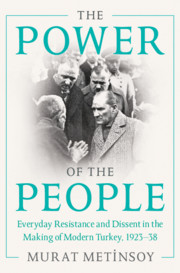Book contents
- The Power of the People
- Maps
- The Power of the People
- Copyright page
- Contents
- Figures
- Acknowledgments
- Introduction
- Part I Everyday Politics of Peasants
- Part II Everyday Politics of Urban Labor
- Part III The Power of Popular Culture
- 10 Hotbeds of Opposition to Secularism
- 11 Informal Media vs. Official Discourse
- 12 Neither Fez Nor Hat
- 13 Negotiating Anti-veiling Campaigns
- 14 Old Habits Die Hard
- Concluding Remarks
- Epilogue
- Notes
- Bibliography
- Index
11 - Informal Media vs. Official Discourse
Word of Mouth, Rumors and Placards
from Part III - The Power of Popular Culture
Published online by Cambridge University Press: 24 December 2021
- The Power of the People
- Maps
- The Power of the People
- Copyright page
- Contents
- Figures
- Acknowledgments
- Introduction
- Part I Everyday Politics of Peasants
- Part II Everyday Politics of Urban Labor
- Part III The Power of Popular Culture
- 10 Hotbeds of Opposition to Secularism
- 11 Informal Media vs. Official Discourse
- 12 Neither Fez Nor Hat
- 13 Negotiating Anti-veiling Campaigns
- 14 Old Habits Die Hard
- Concluding Remarks
- Epilogue
- Notes
- Bibliography
- Index
Summary
This chapter reveals and examines the ways ordinary people expressed, disseminated and exchanged contrary views and subversive opinions. It especially focuses on three avenues through which the people’s voice and opinions were expressed and circulated: daily conversations, rumors and placards. The first and foremost thing the people were involved in was daily chats. The people expressed their contrary views when they came together in relatively safe places free from the state’s control, like houses, coffeehouses or gardens. Daily conversations were generally accompanied by rumors. Everyplace in the country was awash with numerous rumors. Rumors, mostly unfounded, expressed the hopes, desires or fantasies of people discontented with the regime, the government or a specific policy. Rumors challenged and sometimes undermined the credibility of the official propaganda and discourse. Finally, in those public places where open talks were risky, the people aired their grievances, contrary arguments and even criticisms through handwritten papers affixed on walls, trees or doors. All these operated as alternative media challenging the official propaganda of the government and its mouthpieces, the formal press.
- Type
- Chapter
- Information
- The Power of the PeopleEveryday Resistance and Dissent in the Making of Modern Turkey, 1923-38, pp. 222 - 233Publisher: Cambridge University PressPrint publication year: 2021



